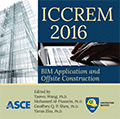International Conference on Construction and Real Estate Management 2016
Green Building in the Context of the Sustainable Development of Urban Ecology
Publication: ICCREM 2016: BIM Application and Off-Site Construction
ABSTRACT
In recent years, China has been plagued by high energy consumption of buildings industry. Although Chinese residential building energy consumption is huge and has a strong rigidity, it also has great potential in energy consumption decreasing. As an important part of sustainable development of urban ecology, the green building industry in cities will no doubt be a great breakthrough in achieving an ecology friendly outcome. Based on the statistical data and related literature, the article analyzes the energy consumption problems in urban housing construction in China, namely, overdevelopment featuring large-scale housing construction, unreasonable construction layout, great energy consumption, so green building and development of affordable housing lags far behind. The article continues to analyze the causes of green building construction lag, which include unreasonable design and immature implementing technologies of green building, together with the lack of both policy control and public awareness of the concept. Therefore, this study suggests the government enhance the environmental awareness, enterprises innovate technologies and design green buildings with ecology friendly concepts, and the public participate in environment protection actively. As a consequence, we can promote the development of green building and contribute to the sustainable development of urban ecology. Houses are the necessity of human life. Housing issues concern life, work and vital interest of the masses. With the upgrading of people’s life quality, residents have growing demands for quality living conditions including area of dwelling structure, interior environment, building location and ancillary facility of the residential buildings. These demands lead to the sustained growth of the energy consumption to realize the traditional residential building functions. And energy consumption is estimated to be one of the major growths of energy consumption in the future. According to the official statistics from Chinese government, the total energy consumed in China was 361.73201 million tons in 2012, and the energy consumed on construction industry was 6.16737 million tons, while in 2013, the national energy consumption reached 375 million tons and construction accounted for one third of the total amount. The sustainable development of urban area refers to the comprehensive development in economy, society and environment, based on the sustainable utilization of natural resources and favorable natural environment. And it is seeking for comprehensive progress in society ensures the sustainable development of economy. To balance the conflicts among economy, environment and society in urban sustainable development, Chinese government needs to abandon the existing development models, which only targeted at GDP, and incorporate with social forces such as social organizations and members to positively enhance green environment protection awareness, and collect governmental advantages, fully utilize technology and science, stressing policy and strategy making and management, and encourage public involvement, so as to speed up the application of green building of urban residence areas to guarantee the sustainability of urban ecology.
Get full access to this chapter
View all available purchase options and get full access to this chapter.
REFERENCES
Liu, L.D. (2009). “The current situation of building energy consumption, planning programming of energy-saving and emission-reduction and utilization of renewable resources.” The Design of Hydroelectric Station, (12), 107–118. (in Chinese).
Lu, K. (2010). “The reform and its methods of the low carbon utilization model of urban land.” Chinese Population Resource and Environment, (12), 62–66. (in Chinese).
Ministry of Housing and Urban-Rural Development (MHURD). (2014). The announcement of national standards of evaluation standard of green building, Beijing. (in Chinese).
National Bureau of Statistics (NBS). (2015). “China National Statistics Yearbook.” <http://data.stats.gov.cn/workspace/index?m=hgnd> (Aug. 12, 2015). (in Chinese).
Qiu, B.X. (2009). “The transform trend of our cities’ development model: low carbon eco-city.” Study of City Development, (16), 19–24. (in Chinese).
Information & Authors
Information
Published In
ICCREM 2016: BIM Application and Off-Site Construction
Pages: 737 - 742
Editors: Yaowu Wang, Ph.D., Professor, Harbin Institute of Technology, Mohamed Al-Hussein, Ph.D., Professor, University of Alberta, Geoffrey Q. P. Shen, Ph.D., Professor, The Hong Kong Polytechnic University, and Yimin Zhu, Ph.D., Professor, Louisiana State University
ISBN (Online): 978-0-7844-8027-4
Copyright
© 2017 American Society of Civil Engineers.
History
Published online: Aug 14, 2017
Authors
Metrics & Citations
Metrics
Citations
Download citation
If you have the appropriate software installed, you can download article citation data to the citation manager of your choice. Simply select your manager software from the list below and click Download.
